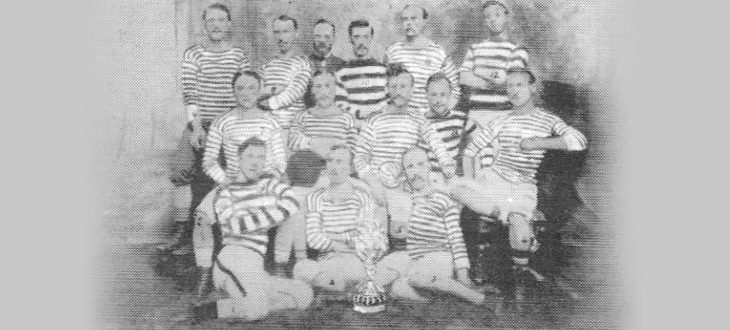Win win situation
Much is quite rightly made of football’s modern-day Invincibles – those teams that complete an entire season without experiencing a defeat.
Rarer still is a side that wins every single match that it plays, but that’s precisely what the Cliftonville squad of 1882/83 achieved en route to celebrating the Club’s maiden Irish Cup success.
What perhaps reduces the significance of that particular achievement, however, is the fact that every Cup winner of the era was by necessity invincible. The Irish Football League having not yet been established, the only competitive fixtures that teams contested during friendly-strewn campaigns came in the Irish Cup – but, given the Club’s often distressing relationship with the tournament in the period since, every such triumph deserves its place in the spotlight.
Continuing a retrospective series examining noteworthy seasons in the Club’s history, cliftonvillefc.net today reflects on the facts and figures behind a year that went from the ridiculous to the sublime, all thanks to the man who had only recently brought football to Ireland.
October
Cliftonville’s first fixture of the season saw the Club’s founding father, John McCredy McAlery, dispense of his familiar full-back duties to perform the role of goalkeeper for an October 7 friendly with Distillery. Nine unanswered goals later and he would surely have rethought any plans for a career change.
A 3-2 defeat to Wellington Park followed before the Reds’ first win of the campaign – a 4-3 victory over Ulster – kick-started a run of positive form, with October rounded off with a 3-2 win against Avoniel.
November
Three games, three high-scoring triumphs as the Reds began to work through the gears at the expense of Malone (6-4), Third Lanark Volunteer Regiment (4-3) and near neighbours Oldpark (6-0).
December
No formal records exist in relation to Cliftonville’s fixtures against Ligoneil and Distillery on December 2 and 16, respectively, however the former were defeated 4-0 two days before Christmas, while the Reds completed 1882 with a 5-1 home loss to Queens Park in which the team’s scorer was infamously listed as ‘Scrimmage’.
January
A 4-0 win over Down Athletic teed Cliftonville up for their first competitive outing of the season, when Ligoneil were thumped 7-2 in the first round of the Irish Cup on January 20.
March
Following a home friendly with Queens Island – the result of which remains unknown – the Reds fell to a rare defeat when Ulster secured a 2-0 triumph on March 10 before drawing 2-2 at home against Scottish visitors Abercorn.
April
A new month heralded a return to Irish Cup action and, after Billy McWha’s strike proved enough to edge past the challenge of Moyola Park in the quarter-finals, a hat-trick from Fred Brown, two goals from Edward Spiller and efforts courtesy of Renwick Potts and Jack Davison secured a convincing 7-0 victory over Alexander in the last-four.
May
Having lost the first two Finals in the competition’s history, Cliftonville first ever Irish Cup success was confirmed on May 5, 1883 when Ulster were comprehensively overcome 5-0 at the Bloomfield Ground; Davison, Potts (2) and McWha (2) on target.
In Review
Cliftonville scored 20 goals in their four Irish Cup fixtures, conceding just two – both against Ligoneil in the first round.
The only player to feature in all four competitive games throughout the campaign was goalkeeper RJ Houston.
While the Club’s founding father John McCredy McAlery relinquished any notions of establishing himself as a goalkeeper and played in an outfield role during the campaign, his co-founding colleague RM Kennedy umpired the Irish Cup Final.
Though seven of the team’s goals are unaccounted for, Fred Brown, Billy McWha and Renwick Potts stand as the unofficial joint-top scorers with three each.


